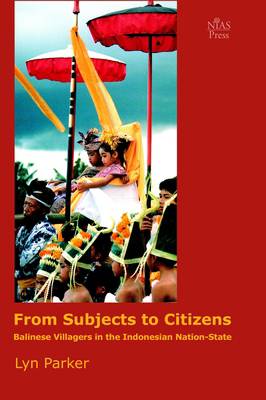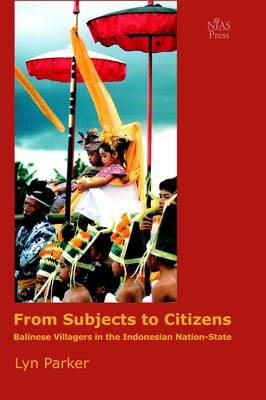
- Retrait gratuit dans votre magasin Club
- 7.000.000 titres dans notre catalogue
- Payer en toute sécurité
- Toujours un magasin près de chez vous
- Retrait gratuit dans votre magasin Club
- 7.000.0000 titres dans notre catalogue
- Payer en toute sécurité
- Toujours un magasin près de chez vous
From Subjects to Citizens
Balinese Villagers in the Indonesian Nation-State
Lyn Parker
Livre relié | Anglais
90,45 €
+ 180 points
Description
Broadens the discussion on the expansion of the Indonesian state into the local community. Significant because it shows how we can understand Indonesia in its efforts to become a nation-state. Unusual in showing that the experience of many Indonesian citizens was not of a menacing and coercive state but of a modernizing and developmentalist nation-state.
This book analyses the processes by which conservative and introverted Balinese villagers have been incorporated into the Indonesian nation-state. It explores the changing social relations of villagers in their transformation from being subjects of their local "king" to anonymous citizens of the Republic of Indonesia. Although the national unity of Indonesia is now hotly contested, the Suharto regime was long-lived and a development success-story. This book is significant because it shows how we can understand Indonesia in its efforts to become a nation-state. While not in any way attempting to apologize for or glorify the Suharto regime, this study is unusual in showing that the experience of many Indonesian citizens was not of a menacing and coercive state but of a modernizing and developmentalist nation-state.Spécifications
Parties prenantes
- Auteur(s) :
- Editeur:
Contenu
- Nombre de pages :
- 288
- Langue:
- Anglais
Caractéristiques
- EAN:
- 9788791114045
- Date de parution :
- 30-11-03
- Format:
- Livre relié
- Format numérique:
- Genaaid
- Dimensions :
- 156 mm x 243 mm
- Poids :
- 625 g

Les avis
Nous publions uniquement les avis qui respectent les conditions requises. Consultez nos conditions pour les avis.






